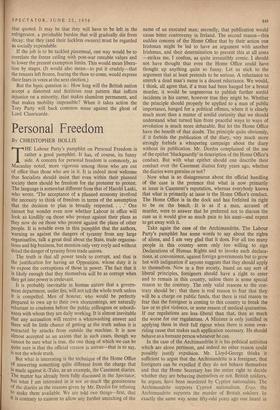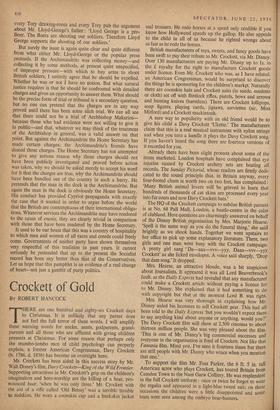Personal Freedom
By CHRISTOPHER HOLLIS THE Labour Party's pamphlet on Personal Freedom is rather a good pamphlet. It has, of course, its funny side. A concern for personal freedom is commonly, as Macaulay noted, more vigorous among those who are out of office than those who are in it. It is indeed most welcome that Socialists should insist that even within their planned society there should be freedom for the protester to protest. The language is somewhat different from that of Harold Laski, who wrote, 'The acceptance of a planned economy involved the necessity to think of freedom in terms of the assumption that the decision to plan is broadly respected. . . .' One cannot but wonder even now whether Labour in office will look a§ kindlily on those who protest against their plans as they now do on those who protest against the plans of other people. It is notable even in this pamphlet that the authors, warning us against the dangers of tyranny from any large organisatron, talk a great deal about the State, trade organisa- tions and big business, but mention only very coyly and without detail the danger of tyranny from trade unions.
The truth is that all power tends to corrupt, and that is the justification for having an Opposition, whose duty it is to expose the corruptions of those in power. The fact that it is likely enough that they themselves will be as corrupt when they get into power is irrelevant.
It is probably inevitable in human nature that a govern- ment department, under fire, will not tell the whole truth unless it is compelled. Men of honour, who would be perfectly prepared to own up to their own shortcomings, are naturally reluctant to condemn before the public colleagues or subordi- nates with whom they are daily working. It is almost inevitable that any accusation will receive a whitewashing answer and there will be little chance of getting at the truth unless it is extracted by attacks from outside the machine. It is now almost accepted as an axiom that in such cases, though we cannot be sure what is true, the one thing of which we can be quite sure is that the official version is untrue—that is to say, is not the whole truth.
But what is interesting is the technique of the Home Office of answering something quite different from the charge that is made against it..Take, as an example, the Casement, diaries. The matter has already been fully discussed in the Spectator, but what r am interested in is not so much the genuineness of the diaries as the reasons given by Mr. Deed-es for refusing to make them available. We are told two things—first, that it is contrary to custom to allow any further smirching of the name of an executed man; secondly, that publication would cause bitter controversy in Ireland. The second reason—this sudden concern of the Home Office that by their action one Irishman might be led to have an argument with another Irishman, and their determination to prevent this at all costs —strikes me, I confess, as quite irresistibly comic. I should not have thought that even the Home Office could have thought up anything quite so funny. Let us stick to the argument that at least pretends to be serious. A reluctance to smirch a dead man's name is a decent reluctance. We would, I think, all agree that, if a man had been hanged for a brutal murder, it would be ungenerous to publish further sordid incidents in his career, however true they might be. Whether the principle should properly be applied to a man of public importance, hanged for a political offence, where it is clearly much more than a matter of sordid curiosity that we should understand what turned him from peaceful ways to ways of revolution is much more debatable. But let the Home Office have the benefit of that doubt. The principle quite obviously, if it forbids the publication of the diary, very much more strongly forbids a whispering campaign about the diary without its publication. Mr. Deedes complained of the use of the epithet 'blackguardly' in description of the Home Office's conduct. But with what epithet should one describe their conduct over the Casement diaries forty years ago, whether the diaries were genuine or not?
Now what is so disingenuous about the official handling of the case is the pretence that what is now primarily at issue is Casement's reputation, whereas everybody knows that what is primarily at issue is the Home Office's conduct. The Home Office is in the dock and has forfeited its right to be on the bench. It is as if a man, accused of murder, were to answer that he preferred not to discuss the case as it would give so much pain to his aunt—and expect to get away with it.
Take again the case of the Archimandrite. The Labour Party's pamphlet has some words to say about the rights of aliens, and I am very glad that it does. For all too many people in this country seem only too willing to sign Declarations of Human Rights and to invoke such declara- tions, at convenience, against foreign governments but to grow hot with indignation if anyone suggests that they should apply to themselves. Now in a free society, based on any sort of liberal principles, foreigners should have a right to enter and to remain in this country, unless there is some special reason to the contrary. The only valid reasons to the con- trary should be : that there is real reason to fear that they will be a charge on public funds, that there is real reason to fear that the foreigner is coming to this country to break the law or to plot violence, or some reason of medical quarantine. If our regulations are less liberal than that, then so much the worse for our regulations. A Minister is only justified in applying them in their full rigour when there is some over- riding cause that makes such application necessary. He should behave as a humane person whenever he can.
In the case of the Archimandrite it is his political activities which are alone pertinent, and indeed no other reason could possibly justify expulsion. Mr. Lloyd-George thinks it sufficient to argue that the Archimandrite is a foreigner, that foreigners can be expelled if they do not behave themselves and that the Home Secretary has the entire right to decide whether they are behaving themselves or not. British soldiers, he argues, have been murdered by Cypriot nationalists. The Archimandrite supports Cypriot nationalism. Ergo, the Archimandrite supports the murder of British soldiers. In exactly the same way some fifty-odd years ago one heard in every Tory drawing-room and every Tory pub the argument about Mr. Lloyd-George's father : 'Lloyd George is a pro- Boer. The Boers are shooting our soldiers. Therefore Lloyd George supports the shooting of our soldiers.'
But surely the issue is again quite clear and quite different from what either Mr. Lloyd-George or the popular press pretends. If the Archimandrite was collecting money—and collecting it by some methods, at present quite unspecified, of improper pressure—with which to buy arms to shoot British soldiers, I entirely agree that he should be expelled. Whether he was or not I have no notion. But what natural justice requires is that he should be confronted with detailed charges and given an opportunity to answer them. What should be the precise form of trial or tribunal is a secondary question, but no one can pretend that the charges are in any way proved until there has been some such trial. We can all see that there could not be a trial of Archbishop Makarios- because those who had evidence were not willing to give it in public—and that, whatever we may think of the treatment of the Archbishop in general, was a valid answer on that point. But against the Archimandrite the Home Secretary has made certain charges; the Archimandrite's friends have denied those charges. The Home Secretary has not attempted to give any serious reason why those charges should not have been publicly investigated and proved before action was taken, why we should be asked merely to accept his word for it that thc charges are true, why the Archimandrite should have been bundled out of the country in such a hurry. He pretends that the man in the dock is the Archimandrite. But again the man in the dock is obviously the Home Secretary. His conduct has provided Cypriot -propaganda with exactly the case that it wanted in order to argue before the world that the British are contemptuous of their international obliga- tions. Whatever services the Archimandrite may have rendered to the cause of enosis, they are clearly trivial in comparison with those that have been rendered by the Home Secretary.
It used to be our boast that this was a country of hospitality to which men and women of all races and creeds could freely come. Governments of neither party have shown themselves very respectful of this tradition in past years. It cannot seriously be pretended that up to the present the Socialist record has been any better than that of the Conservatives. Let us hope that this pamphlet is an evidence of a real change of heart—not just a gambit of party politics.



































 Previous page
Previous page